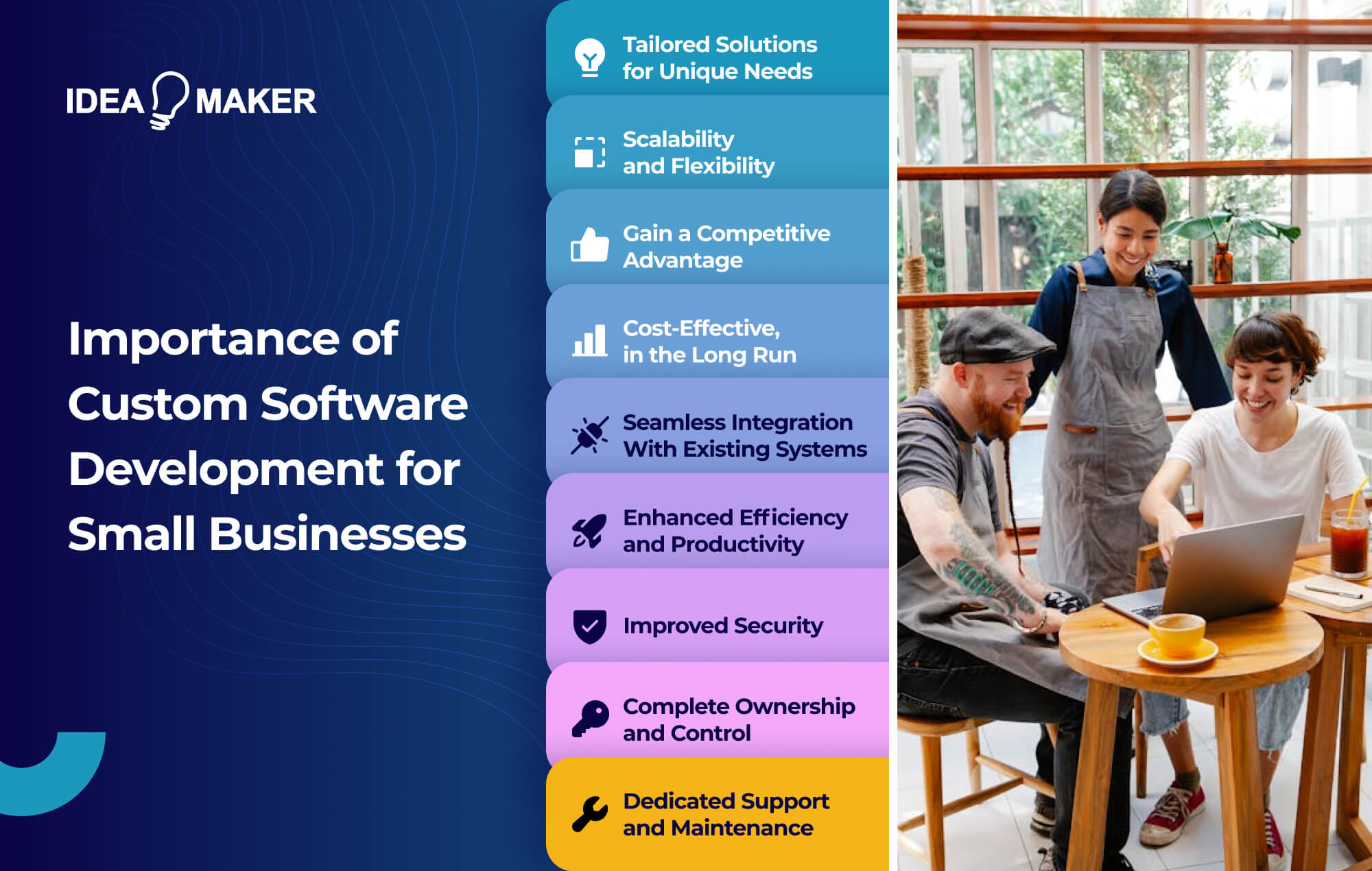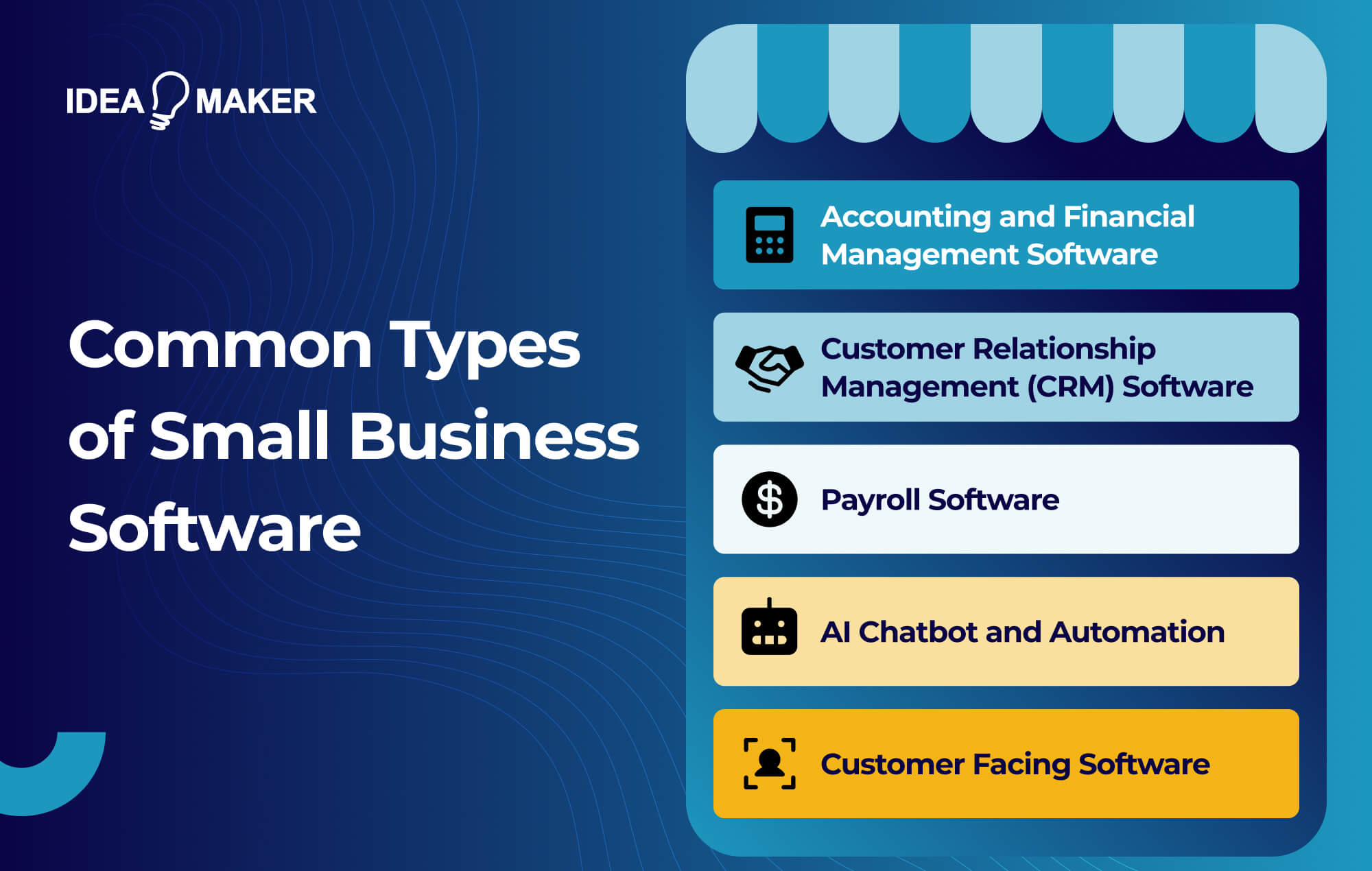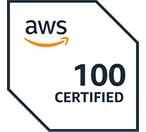Table of Contents
No competitive business today can afford to rely on generic, one-size-fits-all business software. In fact, in order to achieve long-term success, today’s digitally savvy small businesses require solutions tailored to their unique goals, processes, and technical ecosystems – this is where custom software development for small businesses comes in.
Referring to the process of designing and building specialized programs, apps, and systems to match each business’s custom needs, custom development is a necessary component of running a small business today. Rather than shoehorning operations into rigid, off-the-shelf platforms, custom development allows for the creation of targeted software capabilities aligning perfectly with workflows, infrastructure, and objectives.
In this article, we explore everything you need to know about custom software solutions, from assessing needs to finding the right development partner. Read on to learn how custom-built software can help propel your small business forward in the digital age.
What Is Custom Software Development for Small Businesses?
Custom software development for small businesses consists of sourcing custom software development services to design, build, and implement software solutions that meet the specific requirements of the business. Instead of attempting to make do with generic, off-the-shelf solutions, small businesses can leverage a custom software developer to create custom systems, apps, and programs tailored to their goals, workflows, and infrastructure.
The benefits of custom-built software for small businesses stem from the ability to address specific challenges and streamline specialized business processes in a way that mass-market software simply cannot. Custom solutions also provide the flexibility to scale capabilities as the business grows, integrate complex systems, ensure robust security, and boost productivity across operations.
While upfront investment is required, custom software pays dividends in the long run by optimizing workflows, gaining competitive advantages, and increasing return on investment. In today’s digitized business environment, custom software development is becoming increasingly essential for businesses in every industry.
Understanding the Signs That Your Business Needs Custom Software
Many small business owners rely on generic software solutions and legacy systems out of habit and lack of resources, not realizing the limitations this puts on their growth. Here are some clear signals that it may be time to invest in custom software development:
- Tedious manual processes and workflows that cause errors and delays
- Critical business data siloed across disparate systems
- Lack of integration between essential software and databases
- Off-the-shelf systems that can’t scale with rapid business growth
- Changing market conditions that require rapid adaptation
- Competitors utilizing specialized software that gives them an edge
- Lack of customization and flexibility in existing software
- Specialized needs unmet by generic solutions
If your small business exhibits any of these pain points, it’s worth exploring custom software, which is designed to directly address your challenges. The right software development agency can provide an in-depth analysis of where your business processes and systems can be optimized with tailored solutions.
Importance of Custom Software Development for Small Businesses
Now that we’ve covered the basics of custom software for small business, let’s explore the key benefits that tailored solutions can bring to your organization.
Tailored Solutions for Unique Needs
Unlike off-the-shelf platforms that offer generalized functionality aimed at broad industries, bespoke development allows for the creation of systems precisely aligned with your workflows, data, and objectives.
For instance, businesses may face challenges such as disjointed data or inefficiencies in existing processes. Custom software can be designed to seamlessly consolidate information, enhance workflow efficiency, and drive productivity. Whether it involves client portals, inventory management, sales pipelines, or automated reporting, custom software has the flexibility to streamline diverse business processes for optimal efficiency.
Scalability and Flexibility
Another major pain point with generic business software is its overall lack of flexibility. Once you’ve outgrown the capabilities of off-the-shelf platforms, adapting them to new needs is difficult and expensive. Custom systems, on the other hand, can be designed for scalability, meaning they can be expanded over time as business needs evolve.
Need to add locations or additional users? Custom software can easily scale. New product lines or revenue streams? Functionality can be adapted. Ultimately, by designing long-term flexibility into the architecture of custom programs, small businesses ensure their systems can grow and evolve with the company.
Gain a Competitive Advantage
Specialized software tailored for your specific workflows and data can provide innovation and efficiencies competitors lack. Consequently, custom software becomes a proprietary asset that others in your industry don’t have access to, strengthening your competitive positioning.
A good example of customized software would be a supply chain management solution that allows a small manufacturing business to drastically reduce overhead costs. Tighter inventory control and improved demand forecasting capabilities gave them an advantage that boosted market share against larger rivals stuck using generic platforms.
As you can see, finding creative ways to customize systems for your specific needs can lead to game-changing advantages.
Cost-Effective, in the Long Run
Though custom software demands an initial investment, its long-term advantages eclipse off-the-shelf options. Despite appearing pricier upfront, tailored solutions lead to significant savings. This is because, with custom software, you avoid unnecessary costs for features bundled into generic platforms, as it focuses only on vital capabilities.
Unlike mass-market software with ongoing licensing fees, custom solutions spare you from paying for unused functionalities. On top of this, adapting rigid off-the-shelf systems to evolving needs often requires costly developer assistance.
Custom-designed software, however, provides direct control, allowing you to modify and expand as needed. Highlighting the cost-effectiveness, a Gartner report notes a 15 times average return on investment (ROI) for custom solutions, compared to 3 times for off-the-shelf software. This underscores the compelling long-term financial benefits of well-tailored, custom software for small businesses.
Seamless Integration With Existing Systems
A frustrating aspect of ready-made business software involves getting different systems and databases to integrate smoothly. Since off-the-shelf platforms are built generically, connecting them to your other customized systems can require expensive IT resources. Custom software solves this by providing seamless integration from day one.
For instance, your developer can build connectors, APIs, and interfaces for interoperability across your tech stack, pulling data from your existing infrastructure to feed into new programs. This prevents business silos and ensures real-time data flows across accounting, sales, production, inventory, eCommerce, and all other essential systems. The result is integrated tech that allows making data-driven decisions quickly.
Enhanced Efficiency and Productivity
By directly addressing your challenges and optimizing processes with tailored software, businesses can achieve dramatic gains in workflow efficiency, employee productivity, and performance.
In fact, a study conducted by Bank of America Merrill showcased the positive impact of implementing a custom collaboration platform. This custom solution enhanced communication and productivity among their global workforce, providing tangible evidence of the efficiency and productivity gains achievable through tailored software solutions.
Improved Security
Data breaches and cyber attacks are growing threats, especially for small businesses that lack the resources needed to maintain robust security protocols across generic software and legacy systems.
Custom development allows building security into the software DNA with measures like:
- Role-based access controls and permissions
- Advanced encryption and multifactor authentication
- Secure code audits to identify vulnerabilities
- Tight integration across software to prevent security gaps
- Ongoing maintenance, testing, and patches
Security can also be tailored to your industry’s compliance standards, such as HIPAA for healthcare or PCI for eCommerce. Tight security and control over access, combined with maintaining ownership, makes custom software much more secure than off-the-shelf alternatives.
Complete Ownership and Control
When you purchase generic business software, you typically agree to restrictive vendor terms of service that dictate usage and deny access to the source code. This leaves you at the mercy of the vendor’s roadmap and support policies. For this reason, finding the right custom software development vendor is crucial.
With custom development, your small business retains complete ownership and control. The software is built for you and you alone, allowing you to modify, expand, and integrate the solution however you see fit.
Control over your software’s evolution ensures it will continue to meet your needs, not the vendor’s. Direct access to code and systems also provides security and flexibility.
Dedicated Support and Maintenance
While generic software relies on impersonal vendor troubleshooting processes, custom solutions come with direct, tailored support and maintenance. Your development partner has in-depth knowledge of your unique software and provides dedicated resources for ongoing enhancement, troubleshooting, and feature additions.
Having a dedicated development team helps avoid potentially disastrous downtime and ensures your systems continue evolving with your changing needs, as support contracts can be structured in flexible ways, unlike mandated vendor agreements.
Common Types of Small Business Software
Although custom software can optimize nearly any business process, let’s briefly take a look at some of the most common use cases.
Accounting and Financial Management Software
Poorly managed financials and reporting can significantly impede small business performance. Using custom accounting software for small businesses helps centralize data, automate reporting, and provide real-time financial insights. Additionally, built-in controls and audit trails enhance the business’s compliance, closing potential loopholes for financial misappropriation.
Customer Relationship Management (CRM) Software
Streamlining sales pipelines and retaining customers are critical for the growth and success of any small business. Custom CRM software centralizes prospect and client data, simplifies lead tracking, automates follow-ups, and provides valuable sales analytics.
Payroll Software
Handling payroll through paper records and spreadsheets is inefficient and prone to errors. Custom payroll systems seamlessly integrate with accounting, automate tax calculations, and provide reporting required for compliance.
AI Chatbot and Automation
Chatbots boost customer engagement and take over repetitive customer service queries through AI-driven conversational interfaces. Custom AI chatbots can be trained on company data to deliver personalized, on-brand experiences.
Customer Facing Software
Custom portals, mobile apps, and self-service platforms enable customers to directly access your services. This ultimately enhances satisfaction and liberates staff from repetitive interactions.
Common Challenges in Custom Software Development for Small Businesses
While custom small business software provides unmatched benefits, it also comes with potential pitfalls to be aware of. From limited budgets to scope creep, here are a few of the biggest challenges of investing in custom software.
Limited Budgets
As a result, it’s essential to be realistic about return on investment (ROIs), seek developer partners experienced in cost optimization, and consider phased approaches to maintain manageable budgets.
Defining Clear Requirements
Unclear requirements can lead to products that don’t solve the right problems or meet your small business needs accurately. It’s imperative to thoroughly document detailed requirements, obtain stakeholder sign-off, and work closely with your developer before embarking on the journey to build custom software. These steps are crucial for effective requirements gathering.
Scope Creep
Scope creep refers to uncontrolled changes in requirements during development that can lead to software development project delays and budget inflation. Implementing strict change control processes is vital to prevent scope creep.
Measuring ROI
While challenging, calculating returns on investment in software is critical for proving value. This means focusing on quantifying efficiency gains, time savings, increased capabilities, and revenue gains. You should also collaborate with your developer to structure projects for rapid time-to-value.
Finding the Right Development Partner
Choosing the right software development company can be difficult given the myriad of options available. For best results, you should look for proven experts in your industry with a broad technical skill set, excellent communication skills, and a track record of optimizing ROI. Investing time in thoroughly vetting providers will yield significant dividends in the quality of results you can expect.
Custom Small Business Software Development Services by Idea Maker
Selecting the right bespoke software development agency for your small business is a pivotal decision that can significantly influence your project’s success. It requires an expert developer with specialized skills, excellent communication, and a profound understanding of your industry. If you are seeking to hire an extended development team with a proven track record of successful custom projects, technical cross-platform development expertise, and proficiency in AI technologies, look no further than Idea Maker.
Idea Maker specializes in custom software development for small businesses aimed at streamlining operations, gaining strategic advantages, and scaling growth. With expertise spanning various technologies and industries, Idea Maker is an ideal partner for creating flexible, scalable solutions tailored specifically to your needs.
Our development process at Idea Maker commences with in-depth requirements gathering to fully comprehend your business challenges. The team then formulates tailored solutions using proven project management practices to regulate budgets and timelines. All our projects are also centered on rapid iterations and continuous delivery of business value.
Are you ready to transform your small business? Discover the game-changing benefits of custom software tailored specifically to your needs. Schedule a consultation with Idea Maker today, and let’s embark on a journey to streamline your operations, gain a strategic edge, and achieve scalable growth.















